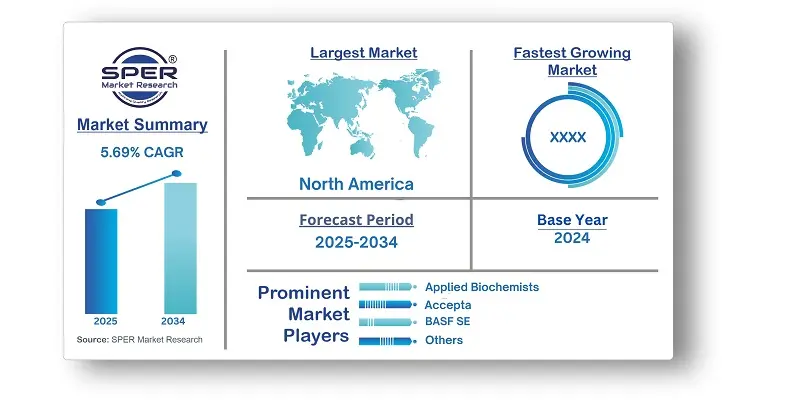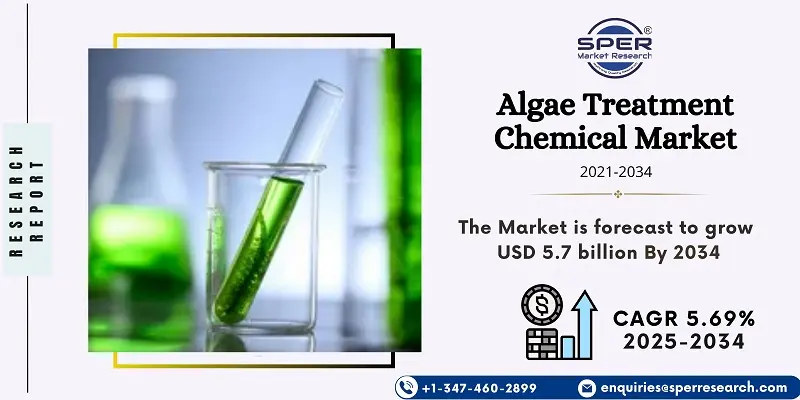Global Algae Treatment Chemical Market Introduction and Overview
According to SPER Market Research, the Global Algae Treatment Chemical Market is estimated to reach USD 5.7 billion by 2034 with a CAGR of 5.69%.
The report includes an in-depth analysis of the Global Algae Treatment Chemical Market, including market size and trends, product mix, Applications, and supplier analysis. The algae treatment chemical industry focuses on producing and marketing substances that control or eliminate algae in environments like industrial sites, aquaculture, and recreational waters. Market growth is driven by rising concerns about water quality and environmental sustainability, increasing demand for effective algae management solutions. Expansion in aquaculture and water treatment sectors, along with stricter regulations, further fuels this growth. However, challenges such as environmental toxicity and resistance development in algae strains require constant innovation and regulatory oversight. Prolonged chemical use can harm ecosystems and lead to reduced treatment effectiveness. Therefore, balancing efficacy with ecological responsibility is crucial, demanding well-regulated application and the development of environmentally safe, innovative formulations to address algae-related issues sustainably.

By Algae Type:
The algae treatment chemical market is segmented by algae types, including green algae, blue-green algae, diatoms, red algae, and others. Among these, green algae hold a dominant position due to their widespread presence in aquatic ecosystems. Their ability to thrive in various environments such as lakes, ponds, and aquariums leads to issues like water discoloration and ecological imbalance. This drives strong demand for targeted treatment solutions, including algaecides and algistats, to effectively manage and control green algae proliferation.
By Product Type:
The algae treatment chemical market is categorized by product type into algaecides, algistats, flocculants & coagulants, and pH adjusters. Among these, algaecides hold a leading position due to their crucial role in effectively controlling algal growth across a wide range of environments. They are vital for maintaining water quality and ensuring the smooth operation of industrial systems, irrigation networks, and aquatic habitats such as lakes, ponds, and pools. Growing environmental awareness and advancements in eco-friendly formulations are driving innovation and expanding opportunities in this segment.
By End Use:
The algae treatment chemical market, segmented by end-use industry, includes water treatment, aquaculture, agriculture, healthcare and pharmaceuticals, food and beverage, and others. Among these, the water treatment sector plays a critical role in combating algae-related challenges in various water bodies. Algae treatment chemicals are essential for controlling blooms, reducing fouling, and improving water quality in settings such as industrial systems, recreational waters, aquaculture, and municipal plants. Growing concerns over environmental sustainability and clean water continue to drive demand for these solutions in the water treatment industry.
By Regional Insights
The North American algae treatment chemical market plays a crucial role in addressing algae-related challenges across diverse water sources such as lakes, ponds, and reservoirs. These chemicals are essential for preventing algal blooms, maintaining water quality, and protecting aquatic ecosystems, recreational areas, and drinking water supplies. Widely used in industrial systems, aquaculture facilities, municipal treatment plants, and recreational sites, they support environmental preservation and water resource management. In the U.S., rising instances of algal blooms have heightened the demand for effective treatment solutions, driving growth in the algae treatment chemical industry.
Market Competitive Landscape
The market is moderately consolidated. Some of the market key players are Applied Biochemists, Accepta, BASF SE, Biosafe Systems LLC, Italmatch Chemicals S.p.A., LG Sonic, Lonza Group, and SePRO Corporation.
Recent Developments:
On December 23, 2021, Arxada AG, a leading specialty chemicals company based in Basel, finalized its acquisition of Enviro Tech Chemical Services, Inc., a well-established manufacturer recognized for its advanced and proprietary antimicrobial and biocidal products.
Scope of the report:
| Report Metric | Details |
| Market size available for years | 2021-2034 |
| Base year considered | 2024 |
| Forecast period | 2025-2034 |
| Segments covered | By Algae Type, By Product Type, By End Use Industry |
| Regions covered | North America, Latin America, Asia-Pacific, Europe, and Middle East & Africa |
| Companies Covered | Applied Biochemists, Accepta, BASF SE, Biosafe Systems LLC, Italmatch Chemicals S.p.A., LG Sonic, Lonza Group, and SePRO Corporation. |
Key Topics Covered in the Report
- Global Algae Treatment Chemical Market Size (FY’2021-FY’2034)
- Overview of Global Algae Treatment Chemical Market
- Segmentation of Global Algae Treatment Chemical Market By Algae Type (Green algae, Blue-green algae, Diatoms, Red algae, Others)
- Segmentation of Global Algae Treatment Chemical Market By Product Type (Algaecides, Algistats, Flocculants & coagulant, pH adjusters)
- Segmentation of Global Algae Treatment Chemical Market By End-use (Water treatment, Aquaculture, Agriculture, Healthcare and Pharmaceuticals, Food and Beverage, Others)
- Statistical Snap of Global Algae Treatment Chemical Market
- Expansion Analysis of Global Algae Treatment Chemical Market
- Problems and Obstacles in Global Algae Treatment Chemical Market
- Competitive Landscape in the Global Algae Treatment Chemical Market
- Details on Current Investment in Global Algae Treatment Chemical Market
- Competitive Analysis of Global Algae Treatment Chemical Market
- Prominent Players in the Global Algae Treatment Chemical Market
- SWOT Analysis of Global Algae Treatment Chemical Market
- Global Algae Treatment Chemical Market Future Outlook and Projections (FY’2025-FY’2034)
- Recommendations from Analyst
1. Introduction
1.1. Scope of the report
1.2. Market segment analysis
2. Research Methodology
2.1. Research data source
2.1.1. Secondary Data
2.1.2. Primary Data
2.1.3. SPER’s internal database
2.1.4. Premium insight from KOL’s
2.2. Market size estimation
2.2.1. Top-down and Bottom-up approach
2.3. Data triangulation
3. Executive Summary
4. Market Dynamics
4.1. Driver, Restraint, Opportunity and Challenges analysis
4.1.1. Drivers
4.1.2. Restraints
4.1.3. Opportunities
4.1.4. Challenges
5. Market variable and outlook
5.1. SWOT Analysis
5.1.1. Strengths
5.1.2. Weaknesses
5.1.3. Opportunities
5.1.4. Threats
5.2. PESTEL Analysis
5.2.1. Political Landscape
5.2.2. Economic Landscape
5.2.3. Social Landscape
5.2.4. Technological Landscape
5.2.5. Environmental Landscape
5.2.6. Legal Landscape
5.3. PORTER’s Five Forces
5.3.1. Bargaining power of suppliers
5.3.2. Bargaining power of buyers
5.3.3. Threat of Substitute
5.3.4. Threat of new entrant
5.3.5. Competitive rivalry
5.4. Heat Map Analysis
6. Competitive Landscape
6.1. Global Algae Treatment Chemical Market Manufacturing Base Distribution, Sales Area, Product Type
6.2. Mergers & Acquisitions, Partnerships, Product Launch, and Collaboration in Global Algae Treatment Chemical Market
7. Global Algae Treatment Chemical Market, By Algae Type, (USD Million) 2021-2034
7.1. Green algae
7.2. Blue-green algae
7.3. Diatoms
7.4. Red algae
7.5. Others
8. Global Algae Treatment Chemical Market, By Product Type, (USD Million) 2021-2034
8.1. Algaecides
8.2. Algistats
8.3. Flocculants & coagulants
8.4. pH adjusters
9. Global Algae Treatment Chemical Market, By End-use, (USD Million) 2021-2034
9.1. Water treatment
9.2. Aquaculture
9.3. Agriculture
9.4. Healthcare and Pharmaceuticals
9.5. Food and Beverage
9.6. Others
10. Global Algae Treatment Chemical Market, (USD Million) 2021-2034
10.1. Global Algae Treatment Chemical Market Size and Market Share
11. Global Algae Treatment Chemical Market, By Region, 2021-2034 (USD Million)
11.1. Asia-Pacific
11.1.1. Australia
11.1.2. China
11.1.3. India
11.1.4. Japan
11.1.5. South Korea
11.1.6. Rest of Asia-Pacific
11.2. Europe
11.2.1. France
11.2.2. Germany
11.2.3. Italy
11.2.4. Spain
11.2.5. United Kingdom
11.2.6. Rest of Europe
11.3. Middle East and Africa
11.3.1. Kingdom of Saudi Arabia
11.3.2. United Arab Emirates
11.3.3. Qatar
11.3.4. South Africa
11.3.5. Egypt
11.3.6. Morocco
11.3.7. Nigeria
11.3.8. Rest of Middle-East and Africa
11.4. North America
11.4.1. Canada
11.4.2. Mexico
11.4.3. United States
11.5. Latin America
11.5.1. Argentina
11.5.2. Brazil
11.5.3. Rest of Latin America
12. Company Profile
12.1. Applied Biochemists
12.1.1. Company details
12.1.2. Financial outlook
12.1.3. Product summary
12.1.4. Recent developments
12.2. Accepta
12.2.1. Company details
12.2.2. Financial outlook
12.2.3. Product summary
12.2.4. Recent developments
12.3. BASF SE
12.3.1. Company details
12.3.2. Financial outlook
12.3.3. Product summary
12.3.4. Recent developments
12.4. Biosafe Systems LLC
12.4.1. Company details
12.4.2. Financial outlook
12.4.3. Product summary
12.4.4. Recent developments
12.5. Italmatch Chemicals S.p.A.
12.5.1. Company details
12.5.2. Financial outlook
12.5.3. Product summary
12.5.4. Recent developments
12.6. LG sonic
12.6.1. Company details
12.6.2. Financial outlook
12.6.3. Product summary
12.6.4. Recent developments
12.7. Lonza Group
12.7.1. Company details
12.7.2. Financial outlook
12.7.3. Product summary
12.7.4. Recent developments
12.8. SePRO Corporation
12.8.1. Company details
12.8.2. Financial outlook
12.8.3. Product summary
12.8.4. Recent developments
12.9. Others
13. Conclusion
14. List of Abbreviations
15. Reference Links
SPER Market Research’s methodology uses great emphasis on primary research to ensure that the market intelligence insights are up to date, reliable and accurate. Primary interviews are done with players involved in each phase of a supply chain to analyze the market forecasting. The secondary research method is used to help you fully understand how the future markets and the spending patterns look likes.
The report is based on in-depth qualitative and quantitative analysis of the Product Market. The quantitative analysis involves the application of various projection and sampling techniques. The qualitative analysis involves primary interviews, surveys, and vendor briefings. The data gathered as a result of these processes are validated through experts opinion. Our research methodology entails an ideal mixture of primary and secondary initiatives.





































